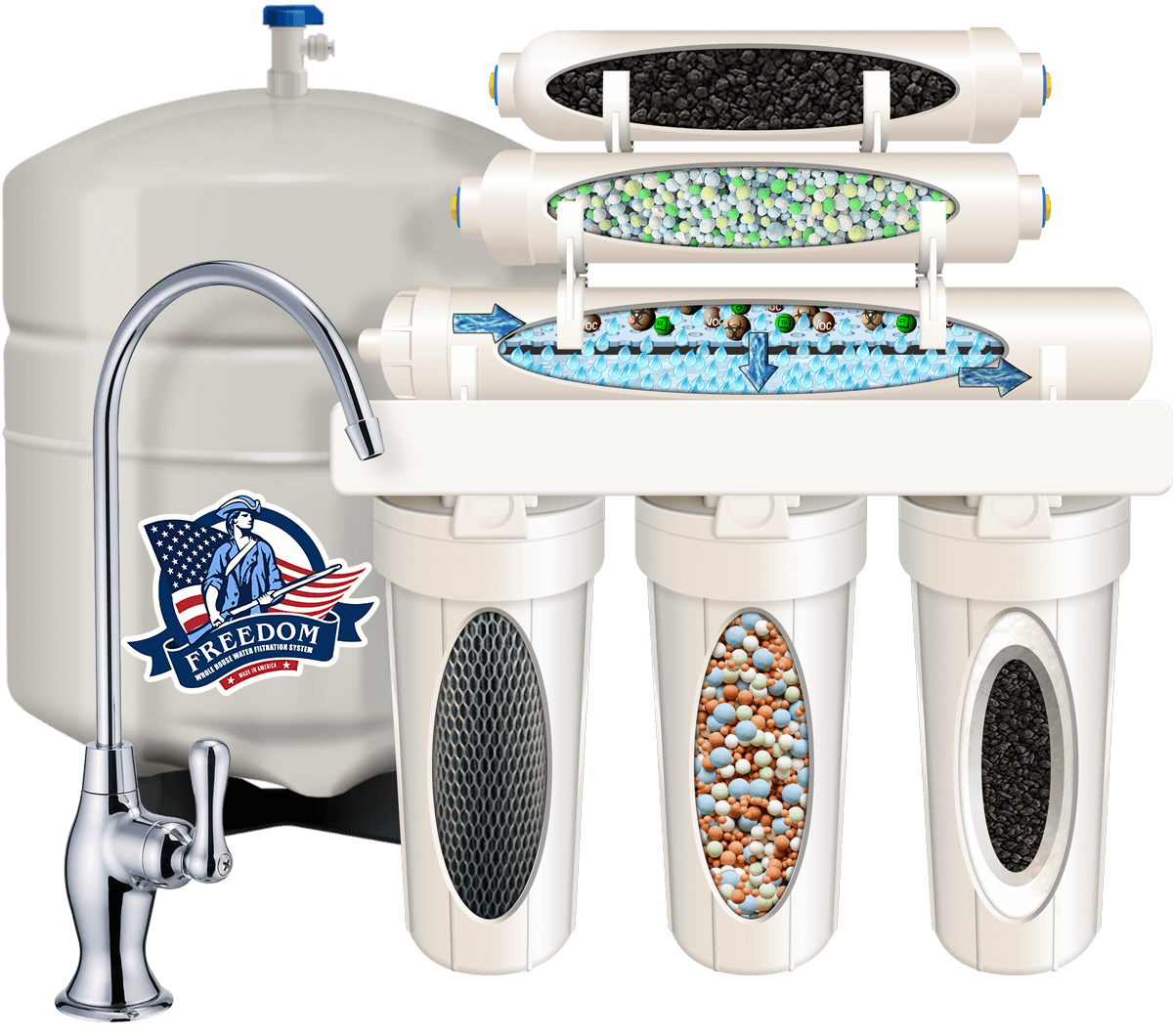-
(11-Stage) Reverse Osmosis Alkaline w/Quantum Disinfection™Regular price $1,495.00
$1,595.00Sale price
Understanding Drinking Water Systems (Under Sink Systems)
What Are Drinking Water Systems?
Drinking water systems, commonly known as under-sink filtration systems, are compact water treatment solutions designed to provide clean and safe drinking water directly from a dedicated faucet. These systems are installed beneath the sink and are often used to improve the quality of tap water by removing a wide range of contaminants. Whether you’re looking to eliminate harmful chemicals, reduce bad tastes, or ensure the safety of your drinking water, under-sink systems offer a convenient, space-saving solution for homeowners.
Common Contaminants Removed by Under Sink Systems
While municipal water is generally treated for safety, it may still contain trace contaminants. Drinking water systems can address the following issues:
1. Chlorine and Chloramine
Many city water systems use chlorine and chloramine for disinfection. Although necessary for killing bacteria and viruses, these chemicals can leave an unpleasant taste and odor in drinking water. Under-sink filters, particularly those with activated carbon, can effectively reduce these disinfectants and their byproducts.
2. Lead and Heavy Metals
Lead contamination can occur in homes with old plumbing systems or in areas where lead pipes were used in the past. Reverse Osmosis (RO) systems are particularly effective at removing lead, along with other heavy metals like arsenic, mercury, and copper, ensuring safer water for drinking and cooking.
3. Fluoride
Fluoride is often added to municipal water supplies to promote dental health, but some people prefer to reduce or remove it from their drinking water. Under-sink reverse osmosis systems are one of the most effective methods for removing fluoride, providing clean, fluoride-free water.
4. Nitrates and Nitrites
Nitrates from agricultural runoff can contaminate water sources, particularly in rural areas. Long-term exposure to high nitrate levels can pose health risks, especially for infants. Under-sink RO systems are capable of removing nitrates and nitrites from water, ensuring safe drinking water for families.
5. Volatile Organic Compounds (VOCs)
VOCs, often found in pesticides, herbicides, and industrial waste, can make their way into drinking water sources. Activated carbon filters used in under-sink systems can reduce the presence of these chemicals, improving the safety and quality of your drinking water.
6. Bacteria and Cysts
Some under-sink filtration systems are equipped to remove microbial contaminants, such as bacteria, viruses, and cysts like Giardia and Cryptosporidium, which can cause gastrointestinal illness. Systems with UV disinfection or microbiological filters can provide an extra layer of protection for well water or areas prone to waterborne pathogens.
Types of Drinking Water Systems
There are several types of under-sink filtration systems, each designed to address different water quality concerns:
- Reverse Osmosis (RO) Systems: These are some of the most comprehensive filtration systems available, using a semi-permeable membrane to remove contaminants such as heavy metals, fluoride, nitrates, and other harmful substances.
- Activated Carbon Filters: These filters are excellent for reducing chlorine, VOCs, and bad tastes and odors. They are ideal for households primarily concerned with improving the taste of water while reducing basic contaminants.
- Dual or Multi-Stage Filtration Systems: These systems combine different filtration technologies, such as activated carbon and sediment filters, to provide more comprehensive water treatment. Multi-stage filters may also include UV light for disinfecting bacteria and viruses.
Benefits of Under Sink Drinking Water Systems
- Improved Water Quality: Under-sink systems ensure clean, filtered water is available directly from your tap, improving taste, smell, and safety.
- Cost-Effective: By installing a drinking water system, you can significantly reduce or eliminate the need for bottled water, saving money in the long run.
- Convenience: These systems are compact, easy to install, and provide instant access to filtered water, making them more practical than countertop filters or pitcher systems.
- Customizable Solutions: Depending on your water quality needs, you can choose a system that targets specific contaminants or opt for comprehensive filtration to address multiple concerns at once.









